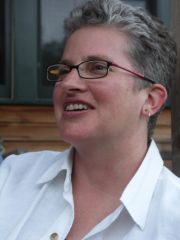Rose Lucas
 Rose Lucas is a Melbourne poet. Her first collection, Even in the Dark (University of WA Publishing), won the Mary Gilmore Award in 2014; her second collection was Unexpected Clearing (UWAP, 2016). She is currently working on her next collection At the Point of Seeing. She is a Senior Lecturer in the Graduate Research Centre at Victoria University.
Rose Lucas is a Melbourne poet. Her first collection, Even in the Dark (University of WA Publishing), won the Mary Gilmore Award in 2014; her second collection was Unexpected Clearing (UWAP, 2016). She is currently working on her next collection At the Point of Seeing. She is a Senior Lecturer in the Graduate Research Centre at Victoria University.
Family Portrait
Van Dyck, c. 1619
In their best Flemish clothes –
lace ruffs and jewelry, brocaded fabric –
this young couple gaze
intense and hopeful
out of the canvas;
they lean toward me as though
all this
were as fast as the shuttering
of a lens;
their bonneted child,
dandled on her mother’s knee,
looks behind and up –
she has no need to look my way;
Her parents are vibrant with
youth and prosperity,
their connection to each other,
their pride in the child;
like every family –
holy in their ordinariness –
they hold the unfolding generations
squirming
in their richly upholstered arms:
Look! we have made this future –
it belongs to us.
Only consider –
(and here the benefit of hindsight)
their willingness to pause,
to sit while a painter
composes
studies
takes their likenesses
in pigment and brushstroke,
placing them
lovingly
within the rushes of time –
Look carefully –
hold fast to the slipperiness of this moment –
it will not always
be like this.
From Mallaig
Heaving out from the harbour,
its narrow lean of wooden houses,
salt-weathered in a cloudy light –
a ferry clanks and judders
picking its way past little boats,
their tangle of nets
and out into the slap and wash of darkening water:
stink of diesel and fish swim
in freshets of air,
rubbing cheeks into ruddiness;
until the hump of island
sails into view –
its possibilities of destination,
palette of smudged greys and greens
flickering through the glass;
the angular spine of the Cuillins
scrapes against
a loamy sky,
writhing in channels of wind;
while, deep in boggy fields,
something
shifts,
restless in peat –
These tannin-soaked fields,
this permeable membrane,
this elongated moment when a boat might
clip and ride,
a shoreline in sight.